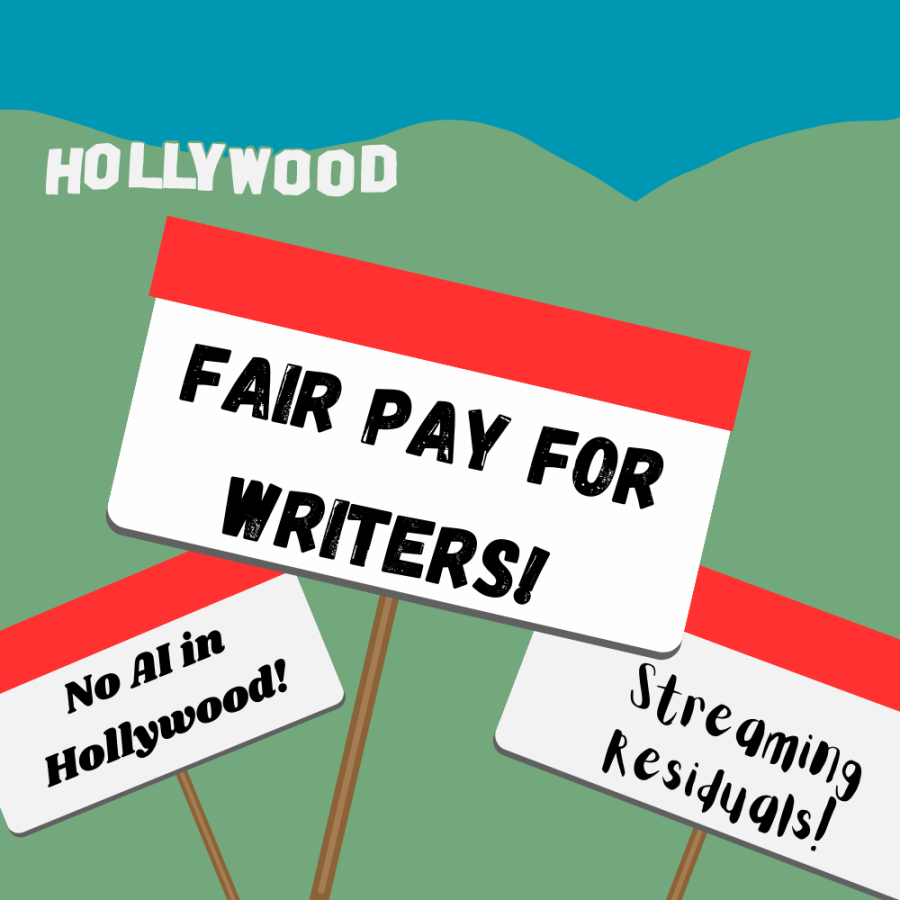After decades of unfair pay, members of the Writer’s Guild of America (WGA) have walked out of the writer’s room and into the picket lines, finally taking a stand against the unfair conditions they have endured since the birth of the industry.
The impacts of the strike have long been discussed as it’s been looming for months. After initial contract negotiations failed, the Alliance of Motion Picture and Television Producers (AMPTP) predicted that a strike would be imminent. However, foresight couldn’t protect the industry from the harsh realities of the strike.
The impacts of the strike were immediate and extensive. Late-night shows were among the first to be affected, as their material is written on a nightly basis. Production stopped on May 2 and will be at a standstill until the strike ends. A few days later, scripted television began to air reruns, as their production has been halted as well.
In the coming months, there will be a noticeable lack of new content on streaming platforms. Popular shows such as Stranger Things, Severance, Yellow Jackets, Cobra Kai, and more have all stopped pre-production, which will delay release dates.
At its center, the WGA strike is about how the entertainment industry has adjusted to streaming becoming the common medium. When a writer works on a project that airs regularly , they earn income for as long as their work is prevalent, gaining bonuses for reruns and international airing. Streaming services, however, do not provide these same benefits. Any type of residual is rare for streaming work, regardless of its popularity.
This inequality is punctuated by the discrepancy between writers and other members of the industry. In 2022, the entertainment industry brought in a profit of nearly $26 billion. Still, the writer’s lifestyle is reliant on always finding a new gig, no matter how successful the last may have been. Under this model, real and lasting success is nearly impossible for writers, no matter how talented they might be.
To combat the dilemma of streaming, the WGA has requested performance-based residuals, which are granted based on how often a piece of media is consumed or by how many people.
The new prevalence of AI is also making waves in the industry. Writers hope to establish safeguards which would prevent their jobs from being replaced with AI. Studio executives, intrigued with the possibilities, want to explore AI, and fear the limitations that might be imposed upon them.
The outpour of support for the WGA has been overwhelming. Hollywood giants including Jennifer Coolidge, Drew Barrymore and Snoop Dogg are only a few of the numerous public figures who have made statements promoting the strike. Not only have celebrities spoken about it, but many are taking to the streets and protesting alongside writers. Bill Nye, Quinta Brunson and Jay Leno were all spotted protesting, among other public figures.
Junior Willa Samuelson is among those providing fortification to the strike. “Writers are being severely underpaid for the amount of work they do,” she explained, “[They] are critical to the entertainment industry, but they are not paid their value.”
Despite the traction the strike has gained, it is predicted that it may last longer than three months. The AMPTP has attempted negotiations, but their sticking points are the same issues as those the WGA is most passionate about. Longer lasting gigs for writers, streaming residuals and mandatory staffing- a minimum number of writers hired by a studio- all may create problems as the strike wears on.
Some have suggested that the key to resolving the WGA strike is for a deal to be made on the Director’s Guild of America (DGA) contract. While the two have differing demands in their new contracts, there is a historic precedent of DGA negotiations resolving WGA difficulties. If an agreement can be reached now, a parallel contract may be successful in bringing writers back to work.
With no end in sight, it’s certain that the Writers’ Strike of 2023 will go down in Hollywood’s history, but two possibilities exist as far as how it will be remembered. In one scenario, the WGA emerges victorious, having made a deal that will permanently improve conditions for writers.
The other option is much more dismal. After a months-long standstill, a content desert may frustrate the public, decreasing the WGA’s traction and forcing them to settle for a less-than-ideal contract.
No matter how the strike is resolved, the entertainment industry will come away with a new perspective and a future irrevoicably altered.









